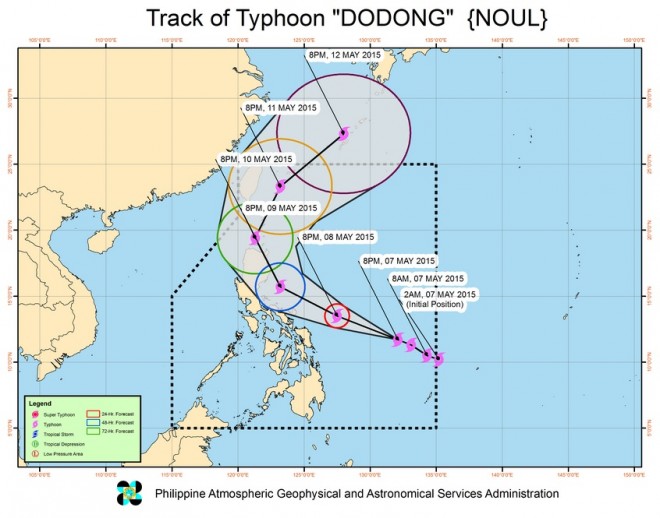MANILA, Philippines–The Philippines is bracing for Typhoon “Dodong” (international name: Noul), which is headed to Luzon and expected to make landfall in the Isabela-Cagayan area on Sunday.
Packing center winds of 150 kilometers per hour with gusts of up to 185 kph, Dodong is expected to bring heavy to intense rainfall in provinces on the eastern seaboard, prompting the National Disaster Risk Reduction and Management Council (NDRRMC) to order emergency preparations, including stockpiling food, water and medicines and readying temporary shelter areas.
Dodong entered the Philippine area of responsibility (PAR) at 4 a.m. on Thursday. It is moving west-northwest at 20 kph, based on the state weather bureau’s bulletin issued at 11 p.m. Thursday.
On Thursday at 11 p.m., the Philippine Atmospheric, Geophysical and Astronomical Services Administration (Pagasa) raised public storm Signal No. 1 over Catanduanes, Camarines Norte, Camarines Sur, Albay, Sorsogon and Polillo Island in Luzon and Northern Samar in the Visayas.
To intensify nearing Luzon
Pagasa said Dodong, the fourth typhoon to hit the Philippines this year, was expected to intensify further as it neared Luzon.
An average of 20 typhoons cross the Philippines annually, with Supertyphoon “Yolanda” (international name: Haiyan), the most destructive on record, leaving more than 8,000 people dead or injured in Eastern Visayas on Nov. 8, 2013.
But Dodong is unlikely to intensify into a supertyphoon, which has maximum sustained winds of at least 220 kph, Pagasa said.
Bicol and Samar provinces will start to feel the effects of the typhoon Friday, the weather bureau said.
Dodong’s eye is forecast to pass close to the Bicol and Samar areas Saturday morning, it added.
Nearly most of Luzon, including Metro Manila, will experience heavy to intense rain, according to Chris Perez, a meteorologist with Pagasa.
Landfall in the north
Pagasa’s latest forecast showed Dodong making landfall in the Isabela-Cagayan area on Sunday, affecting northeastern Luzon before recurving northward to the country’s northernmost province, Batanes.
Farmers in the area, however, are reportedly looking forward to heavy and intense rains, as drought is expected to persist in the far north this month.
Dodong is expected to blow out of the PAR on Monday, Pagasa said.
The weather bureau warned of rough to very rough seas off the eastern seaboard of southern Luzon, Visayas and Mindanao.
Blue alert
The NDRRMC went on blue alert at 5 p.m. on Thursday.
Mina Marasigan, spokesperson for the NDRRMC, said the order for emergency preparations put half of the agency’s personnel on alert for contingencies.
With the blue alert up, regional risk reduction and management councils received orders to prepare for emergencies before the typhoon hit.
“We have provided more information to the local councils so they can put their response teams on standby, preposition [relief] goods and organize preemptive evacuations,” Marasigan said.
Relief supplies
The Department of Social Welfare and Development (DSWD) gave assurance on Thursday that it has adequate relief stocks and standby funds for areas of the country that will be affected by the typhoon.
Social Welfare Secretary Corazon Soliman said 439,808 family food packs worth P153.77 million were available in DSWD field offices across the country, with 91,667 packs stocked at the National Resource Operations Center in Pasay City.
She said the DSWD had P67.1 million in standby funds for buying relief supplies.
The National Grid Corp. of the Philippines (NGCP) also began emergency preparations on Thursday to minimize Dodong’s impact on power service.
Being checked for reliability starting Thursday were communications equipment, availability of hardware, standby generators, vehicles, spares and supplies necessary for the repair of damage to facilities, the NGCP said.
Line crews and helicopters were sent to strategic areas to facilitate immediate power restoration work, the company said.
Drought to continue
The North and South Luzon regional command centers will be activated this weekend as the typhoon begins to whip the eastern parts of the main island, it said.
Drought will continue to persist in Ilocos Norte province while the provinces of Bataan, Biliran, Cavite and Cebu will continue to suffer from a dry spell, according to the weather bureau.
In its latest outlook dated May 4 but released only Thursday, Pagasa said drought and dry spell conditions in the five provinces would continue this month.
But 41 other provinces that have been suffering from drought or a dry spell since early this year can expect conditions to improve within the month, Pagasa said.
According to the latest bulletin, 45 provinces are officially considered under drought or dry spell conditions.
A province is considered suffering from drought when it experiences three consecutive months of way below normal rainfall, or more than 60 percent less than the average rainfall it receives, Pagasa said.
A province that experiences three consecutive months of below normal rainfall, or 21 to 60 percent less than the average rainfall it receives, is considered suffering from a dry spell, it said.–With reports from Julie M. Aurelio, Riza T. Olchondra and wires
RELATED STORIES
Signal No. 1 up in Catanduanes, Northern Samar
